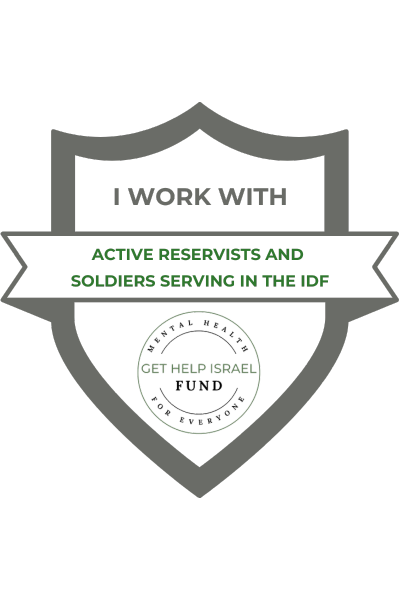Daniella Lang
Credentials
Finances
Licensed in Israel
Licensed Abroad
- Druyanov 5
- Tel Aviv
- Shalom Aleichem 13
- Tel Aviv
- Email Me
-
 Business HoursEvenings
Business HoursEvenings
Daniella Lang
 Verified
Verified
Credentials
Child/Adolescent Psychologist, Clinical Psychologist
PsyD
Finances
500-700 NIS
None
Student Discount
- Druyanov 5
- Tel Aviv
- Shalom Aleichem 13
- Tel Aviv
ABOUT THE THERAPIST
I am a clinical psychologist (Psy.D.) licensed in Israel, Florida, and Illinois. I work with both English and Spanish-speaking clients and specialize in working with children, adolescents, and young adults.
My work is characterized by a client-centered and integrative approach. I engage my clients with the understanding that every individual has their own path requiring a unique roadmap. I draw from a variety of evidence-based therapeutic interventions including cognitive behavioral therapy, family systems, attachment interventions, play therapy, sand tray therapy, solution-focused interventions, existential therapy, narrative therapy, trauma-focused cognitive behavioral therapy, and mindfulness.
Trauma Work I find it particularly meaningful to assist individuals who have faced trauma, facilitating them towards experiencing post-traumatic growth. This transformative journey empowers them to cultivate strength, resilience, and personal development in the aftermath of life’s challenges. I have an extensive background in trauma including working with survivors of domestic abuse, assisting after the Surfside building collapse in Florida, and working with individuals impacted by gun violence in both the Parkland School, Florida and the Highland Park, Illinois shootings. During these tragedies I provided direct support to individuals in addition to working on-site managing crisis teams.
Navigating Life in Israel Israel is experiencing unique and challenging times which further underscores the importance of providing sensitive and effective support. Since moving to Israel, I have provided support to lone soldiers and other individuals and families affected by the current situation. I have also provided consultation to staff and participants from different programs to assist with navigating crises and their responses.
My background has enabled me to work with culturally, linguistically, and socio-economically diverse clients, and I find it essential to be empathic and genuine. My grandparents were Holocaust survivors, my parents are Argentine immigrants, and I am a new immigrant (Olah) to Israel. I have a deep understanding of the cultural complexities and change involved with these transitions and am committed to cultural sensitivity within my clinical work and interpersonal relationships.
Education I received my Doctoral Degree from the Illinois School of Professional Psychology. I completed my American Psychological Association (APA) accredited pre-doctoral internship at Miami Dade County, Community Action & Human Services Department followed by my postdoctoral residency at Nova Southeastern University, Florida. Clinical Experience I have worked with clients who have struggled with a wide range of challenges spanning their entire lifetimes. I received clinical training within universities, schools, hospitals,and community-based settings serving individuals, groups, and families. I have served individuals who have experienced anxiety, trauma, depression, adjustment issues, interpersonal deficits, grief, and struggles with acculturation.
QUALIFICATIONS
PsyD
Illinois School of Professional Psychology
2017
Degree
PsyDEducation
Illinois School of Professional PsychologyYear of Graduation
2017Years in Practice
7
REGISTERED PSYCHOLOGIST IN ISRAEL
Registration in Pinkas Hapsichologim
27-183827
Mumche Category
Clinical Psychologist
Mumche License Number
27-48252
LICENSED IN THE USA
DISTANCE COUNSELING
Online Therapy
PRIMARY SPECIALTIES
Anxiety / Panic
Depression
Stress Management
Trauma / Post Traumatic Stress Disorder PTSD
ADDITIONAL SPECIALTIES
Abuse
Adjustments
Attention Deficit Hyperactivity Disorder (ADHD)
Behavioral Concerns In Children
Family Issues
Grief
Life Transitions
Parenting Issues / Training
Self-Esteem
Self-Harm / Suicide
Sexual Abuse / Rape
CLIENT FOCUS
Population
Children
Adolescents
Adults
Men
Women
Languages Spoken
English
Spanish
TREATMENT APPROACH
Cognitive Behavioral Therapy (CBT)Cognitive Behavioral Therapy (CBT) is a type of psychotherapy that focuses on how one's thoughts, feelings and behaviors are connected and can be changed. It is based on the idea that how we think (cognition) and how we feel (emotion) can influence how we behave. CBT helps people identify and challenge distorted thinking and replace it with more balanced thinking, leading to improved mood and behavior. ‘Homework’, usually containing practical writing exercises, is often completed by the client between sessions to reinforce the therapy. Examples of tools that practitioners often use are journaling, challenging beliefs, and mindfulness.
Existential PsychotherapyExistential psychotherapy is a form of psychotherapy that emphasizes an individual’s subjective experience of existence. It is a philosophical approach to psychotherapy that views the individual as ultimately responsible for creating a meaningful life. This form of psychotherapy helps individuals explore their subjective experiences, understand their personal values and beliefs, find ways to live more authentically, and make meaningful choices. The ultimate goal is to help the individual reach a greater sense of self-awareness and personal fulfillment.
Family Systems TherapyFamily Systems Therapy is an approach to psychotherapy that emphasizes the importance of understanding how the family functions as a whole, and how individual family members interact and affect one another. It focuses on how family dynamics, such as communication patterns, roles, and power dynamics, shape behavior, and how changing these dynamics can lead to positive change. Family Systems Therapy is a collaborative approach, where the therapist works with the family as a whole to identify and address areas of conflict and distress.
Internal Family Systems (IFS)Internal Family Systems (IFS) is an evidence-based psychotherapy that uses the metaphor of an internal family of parts to help people gain awareness of how different parts of themselves can interact in healthy and unhealthy ways. IFS encourages people to become curious about their different parts, with the goal of helping them gain access to their true Self or core. Through this process, people can learn to recognize and care for the different parts of themselves, as well as develop compassionate understanding for the origins of their parts. A key principle of IFS is that each part within the person has its own positive intention and is trying to protect the person in some way. By understanding the positive intention of each part, the practitioner and client can work together to help the parts feel heard and understood, and to find more adaptive ways of meeting their needs. IFS has been found to be an effective treatment for a variety of mental health issues, including depression, anxiety, trauma, and relationship issues.
Interpersonal Psychotherapy (IPT)IPT focuses on the relationships and interactions an individual has with others. It is based on the premise that the way that we interact with others can have a significant impact on our emotional well-being. During IPT sessions, the practitioner will work with the client to identify patterns of behavior and communication that may be contributing to their emotional distress. They will then help the client learn new ways of interacting with others, as well as teach them coping skills to manage difficult emotions. It is a time-limited therapy, typically lasting between 12-16 weeks, with the goal of helping the client develop long-term coping skills.
Mindfulness-Based Cognitive Therapy (MBCT)Mindfulness-Based Cognitive Therapy (MBCT) is a form of therapy that combines cognitive behavioral therapy with mindfulness practices. It is based on the idea that our thoughts, emotions, and physical sensations can affect our mental health. MBCT helps individuals become aware of their thoughts, emotions, and physical sensations in order to gain insight and control over them. MBCT helps clients learn how to recognize their sense of being and see themselves as separate from their thoughts and moods. This separation can free the client from thought patterns in which the repeated negative messages may be dominating the client’s focus. After developing an awareness of the separation between thoughts, emotions, and the self, people in treatment may find that while the self and the emotions may exist simultaneously, they do not have to exist within the same dimension. The healing can take place when one learns how to interject positive thoughts into negative moods and thereby create a shift in mood.
Narrative TherapyNarrative therapy is a form of psychotherapy that focuses on the stories, or narratives, of a person's life in order to help them gain insights into their situation and develop skills to make positive changes. It is based on the idea that people construct their own stories and meanings to make sense of their lives and experiences. It emphasizes the strengths, values, and skills of the person, while also exploring the influences of culture and context on their life. Narrative therapy seeks to empower individuals by helping them to identify and use their inner resources to overcome challenges and create positive change.
Person-Centered Therapy (Rogerian Therapy)Person-centered therapy, or Rogerian therapy, was developed by Carl Rogers in the 1940’s. It is a form of talk therapy that emphasizes the importance of providing psychological safety, unconditional positive regard, and empathic understanding to clients. This type of therapy is based on the belief that individuals have an innate capacity for self-actualization and self-understanding and that the therapist's role is to provide a supportive environment in which this process can take place. Through the use of active listening, open-ended questions, and non-judgmental reflection, the therapist helps the client to explore their thoughts, feelings, and experiences in a safe and accepting environment. By doing so, clients are able to gain insight into their issues, develop a greater understanding of themselves, and work towards personal growth.
Play TherapyPlay therapy is an evidence-based, developmentally appropriate form of intervention used to facilitate emotional, cognitive, and social growth in children. Play therapy is based on the premise that play is the child's natural medium of self-expression and can be used to assess and help a child work through difficult emotions, thoughts, and behaviors. The goal of play therapy is to help children develop the skills and abilities to navigate life stressors, and build self-esteem. During treatment, the therapist creates a comfortable, safe environment (a playroom) for the child to play with as few limits as possible. The toys in the playroom are intended to encourage the child to express his or her feelings and develop healthier behaviors. The child’s “play” with these toys serve as the child’s symbolic words, which may be difficult to express otherwise.
PsychodramaPsychodrama is a form of experiential therapy that can help people gain insight into their own behavior and develop healthier coping strategies. It involves using role-playing and group dynamics to explore and act out different scenarios in a safe setting. Psychodrama is grounded in principles of creativity and spontaneity. It evokes cognitive, emotional, and behavioral responses in those in treatment and helps them achieve new perspectives through better understanding of their roles in life and the ways that they interact with others.
Psychodynamic TherapyPsychodynamic therapy is a form of therapy that focuses on the unconscious mind and how it affects behavior. It works to help people understand and work through past experiences and feelings that may be causing difficulties in the present. This type of therapy encourages individuals to explore their emotions, relationships, and behaviors in order to gain insight into their current difficulties. It can help individuals better understand themselves and their motivations, and gain insight into how past events have impacted their current lives. People tend to develop defense mechanisms when faced with challenges in life. Defense mechanisms may keep painful feelings, memories, and experiences in the unconscious. A few common defense mechanisms include: denial, repression, and rationalization. Psychodynamic therapists encourage people to speak freely about their emotions, desires, and fears. Being open may help uncover vulnerable feelings that have been pushed out of conscious awareness. According to psychodynamic theory, behavior is influenced by unconscious thought. Once painful feelings are brought forth and processed, the defense mechanisms are no longer needed and a person in treatment can start changing unhelpful patterns when coping with life’s challenges.
Sandplay TherapySandplay therapy is a form of psychotherapy that is based on Jungian psychology and is used to help children and adults explore their inner world using symbols and metaphors. It is a form of non-directive play therapy in which participants create a “sandbox” in which they construct three-dimensional scenes using tiny figurines and sand. Sandplay therapy is an effective form of therapy that helps clients explore their inner world, gain insight, and develop creative solutions to their problems. Sandplay therapy allows a person to construct their own microcosm using miniature toys and sand. What’s created acts as a reflection of the person’s own life and allows them the opportunity to resolve conflicts, identify and remove obstacles, and gain acceptance of self.
Solution-Focused Brief Therapy (SFBT)Solution-focused therapy is a type of therapy that focuses on what is going right in a person’s life, as opposed to what is going wrong. It is based on the premise that when a person can identify what is working, they can build on it and make positive changes to the areas of their life that need improvement. A therapist using this approach will often ask questions designed to bring out a person’s strengths and resources, rather than focusing on problems or past issues. The aim of this type of therapy is to help people find solutions to their current problems, in order to build a better future. A solution-focused therapist encourages those in treatment to develop a vision of the future and offers support and guidance as they determine the skills, resources, and abilities needed to achieve that vision successfully.
Systems Theory / TherapySystems therapy is a type of psychotherapy that focuses on understanding how people's behavior is affected by their relationships with others. This form of therapy is based on the idea that the individual is embedded within a larger system, such as a family unit or work environment, and that changes to that system can cause changes in an individual's behavior. Systems therapy emphasizes the importance of understanding how these systems interact and how they can be changed to improve the individual's mental health. The therapist works to identify patterns of behavior in the system, identify areas of conflict or stress, and help the individuals develop strategies to make changes within the system that will lead to healthier outcomes.
Trauma-Focused Cognitive Behavioral Therapy (TF-CBT)Trauma-Focused Cognitive Behavioral Therapy (TF-CBT) is an evidence-based practice used to help children, adolescents and their parents who have experienced a single or multiple traumatic events. This type of therapy combines cognitive and behavioral strategies to help people process their traumatic experiences, manage their distress, develop coping skills, and restore their sense of safety and well-being. TF-CBT focuses on education and skill-building, creating an environment of safety and trust, and using therapeutic activities to help people understand their responses and control their symptoms. Children are shown how perceptions may be distorted and are given the tools to redesign those perceptions. TF-CBT is a skills-based model, and it requires the child and parent to practice its components in order to be optimally effective. Parents and children are commonly asked to practice skills at home.
SERVICES OFFERED
Individual Therapy
Consultation
Hadrachat Horim

 Verified
Verified




